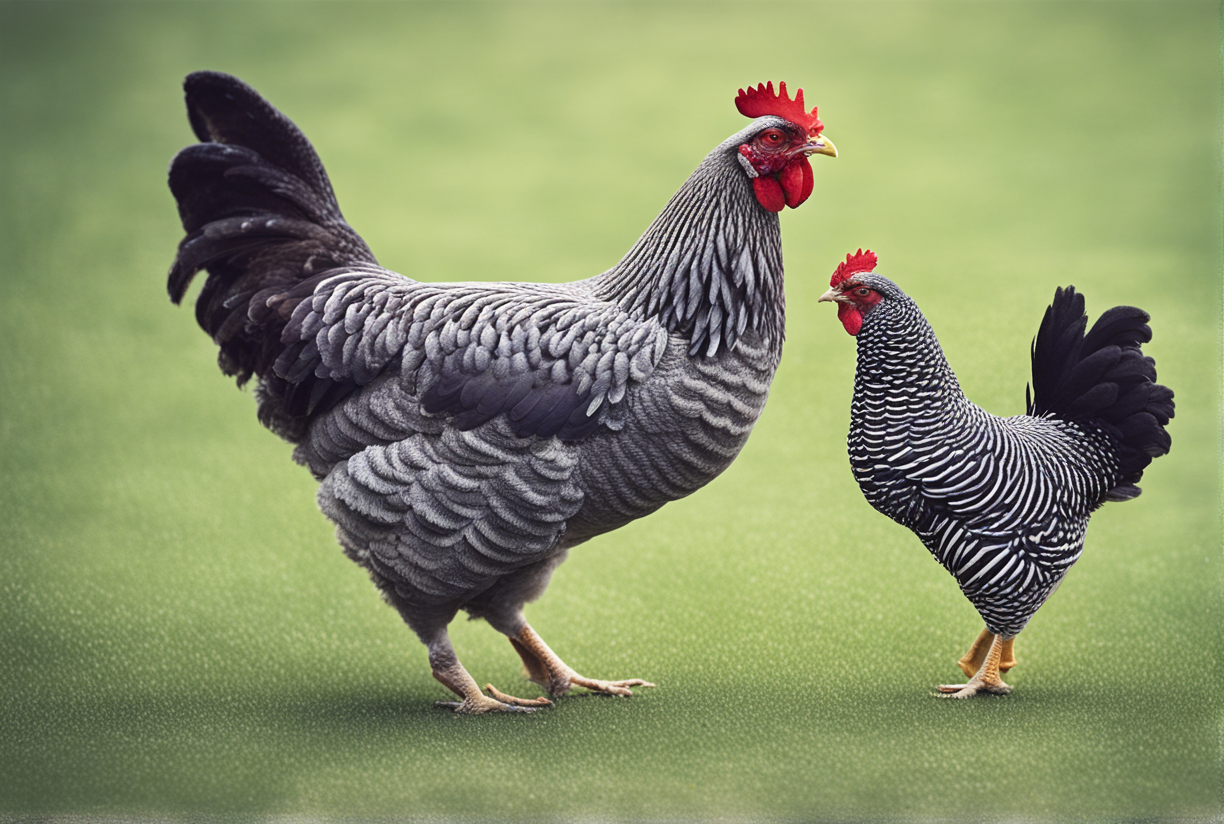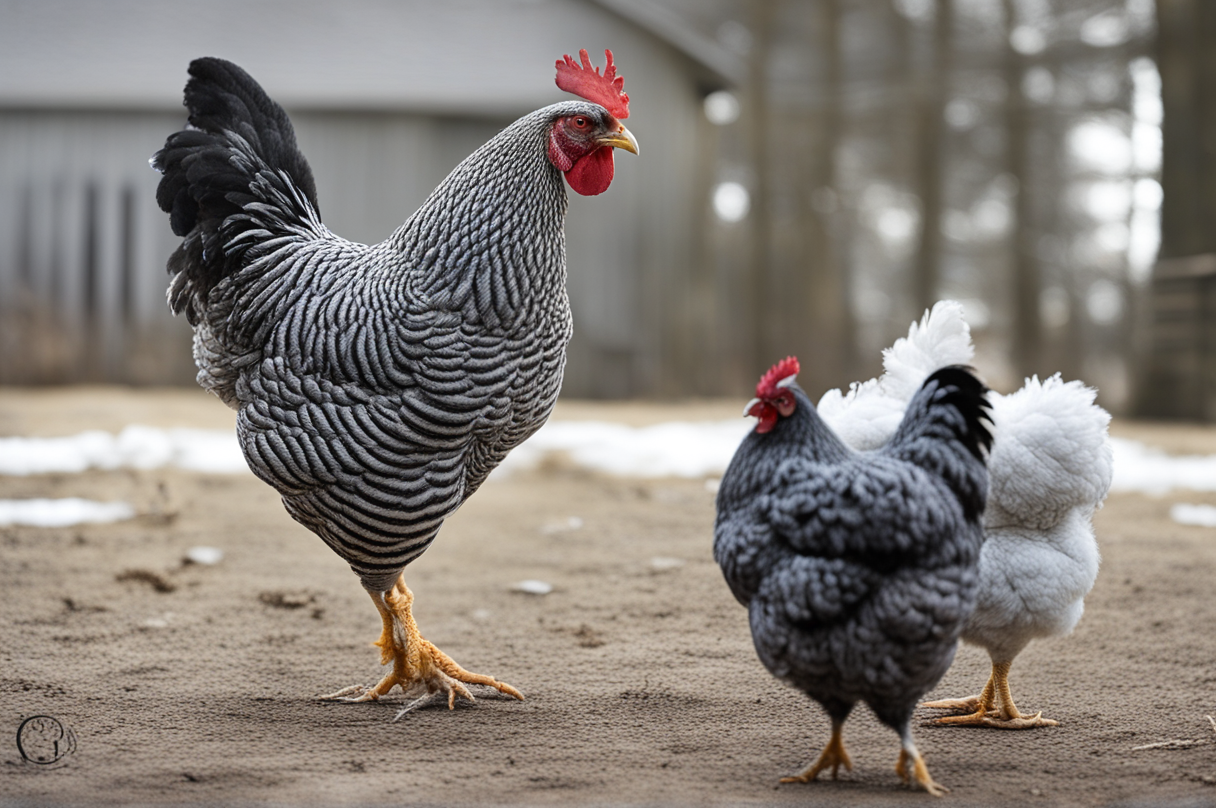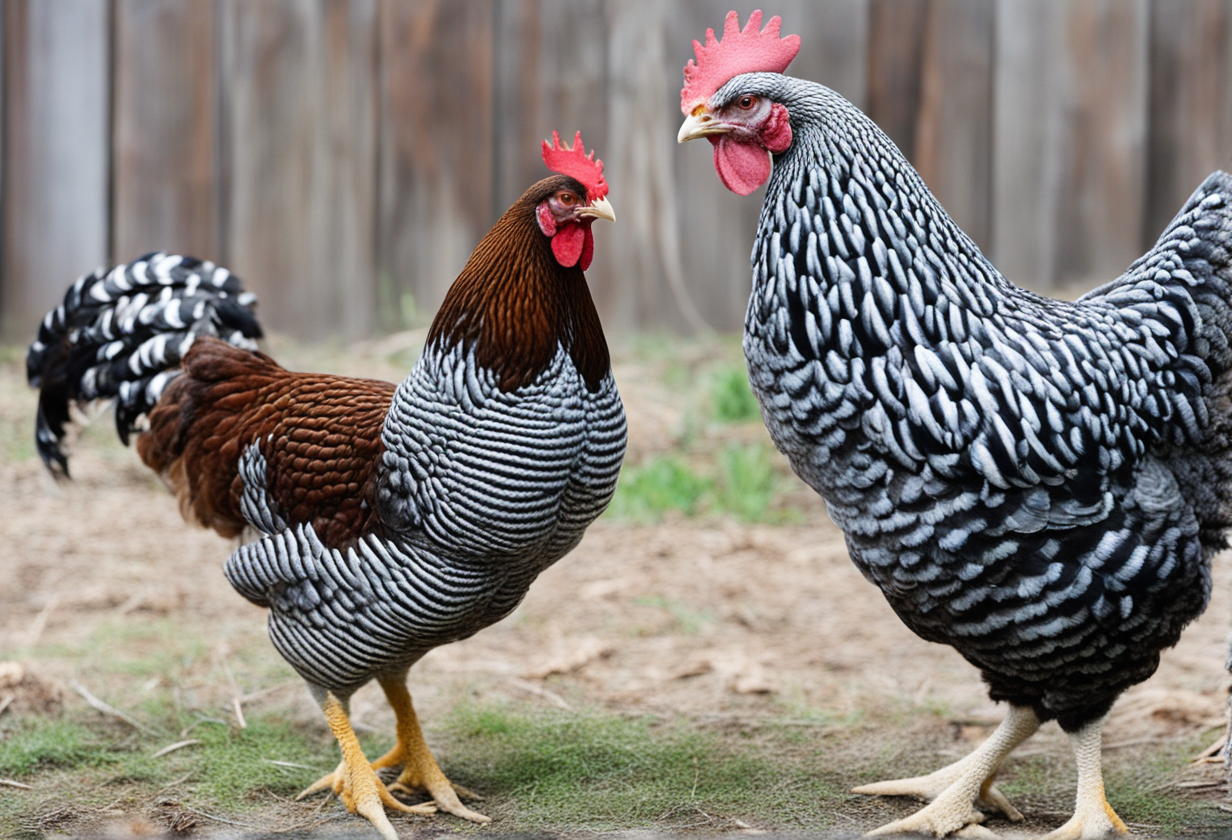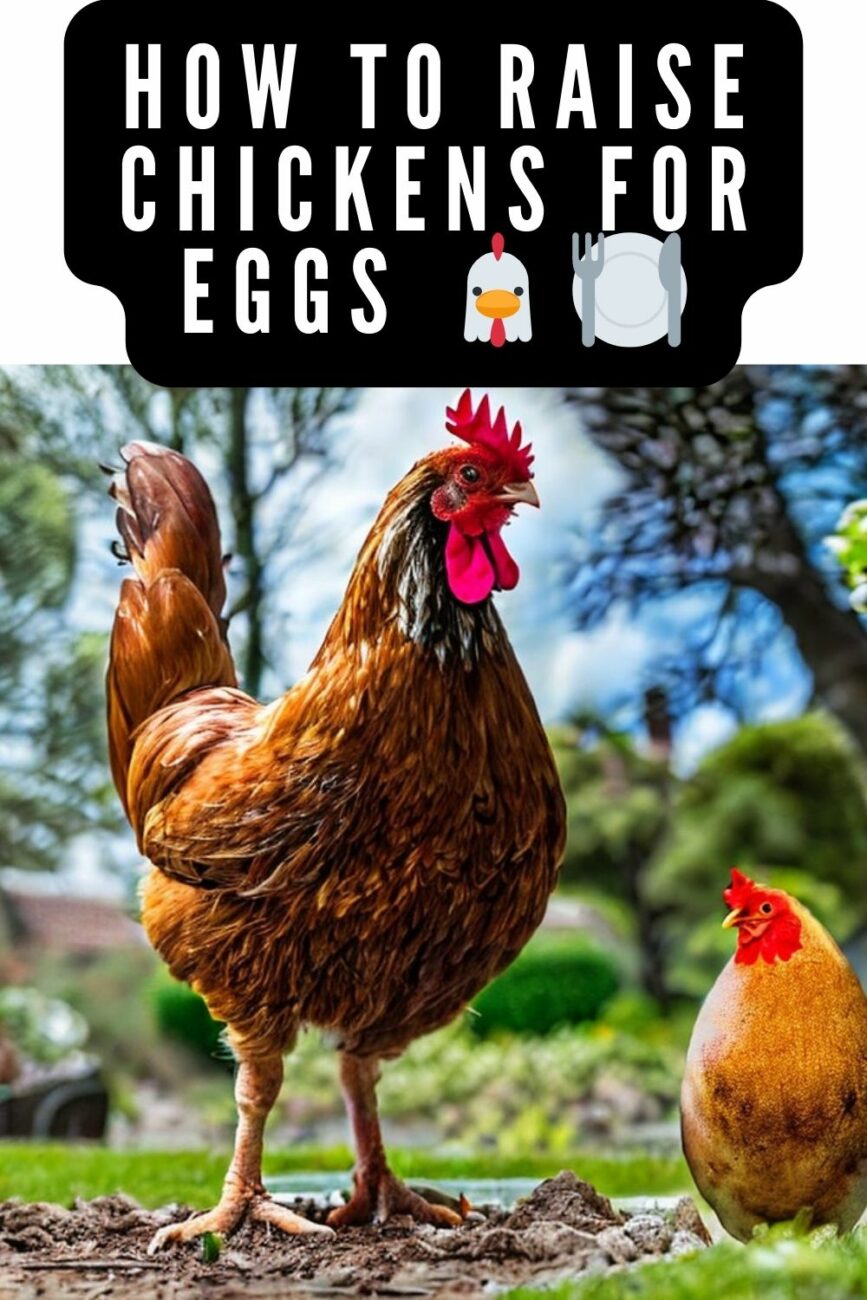So the other day I was out feeding the chickens when I saw my Dominique Dottie and Barred Rock Bertha squaring up to duke it out.
Now these girls have shared the coop since they were chicks so I was real surprised to see them getting feisty.
Turns out the 100 degree weather was getting everyone a little hot under the collar! Had to give them a time out to cool off before anyone lost a feather.
Got me thinking though – what exactly makes these breeds different? Are Dominiques or Barred Rocks a better fit for your flock? Well pull up a stool, pour yourself some sweet tea and let me tell ya all about it.
Temperament
Barred Rocks have a reputation for being friendly yet a bit bossy in the hen house.
Bertha here definitely lives up to that – she’s always clucking orders at the other girls and isn’t afraid to chase off any predators from the coop.

Still, she means well and will come running if she sees you with the feed bucket. They do say Barred Rocks can be a bit dominating though, so if you want a more relaxed flock you may want a different breed.
Now Dominiques like Dottie, they’re what I’d call easygoing chickens. Always strutting around with their high feathers making friends wherever they go.
They don’t seem to get their feathers in a ruffle too often and usually get along peachy with other poultry pals. Dottie always lets the smaller hens eat first and I’ve even seen her preen the rooster before! So if you want birds that can socialize without squabbling, Dominiques may be your ticket.
One thing to watch for is that Dominiques can be a bit timid of strangers at first. It may take them longer to get comfortable with you than a bolder breed.
But once they know you mean no harm, they warm up quick as can be. Bertha on the flip side has never met a person she didn’t like! She comes running every time for scritches without a fuss. So if you want hens your kids can easily handle, a Barred Rock may be braver natured.
Things to remember – Barred Rocks can be on the bossy side with other hens so only get one or two to avoid squabbles. Dominiques tend to be calmer and happier in larger flocks where they can socialize. Both will protect their own but Dominiques may run vs fight where a Barred Rock is more likely to stand her ground.
Egg Production
Now when it comes to the good stuff – eggs! – Barred Rocks really know how to deliver. Bertha here lays like clockwork, 4-5 large brown eggs per week throughout the spring, summer and fall.

Even in the dead of winter when the temps dip down into the teens, I can count on at least 3 eggs from her each week. That kind of consistent output really keeps my omelette game on point year round.
Dominiques on the other hand tend to be more seasonal with their laying. From April through August you can expect 3-4 medium sized cream or brown eggs daily from Dottie. Come September though she starts to taper off until by December she’s only laying once a week if that. Then it takes her right through February to ramp back up. Their production definitely follows old Mother Nature’s schedule close.
So if you need a steady supply of eggs for your family or to sell, a Barred Rock is your best bet. Dominiques are gorgeous birds but not the highest volume layers.
One hack though is to get 2-3 Dominiques. That way even with their seasonal cycles not perfectly overlapping, you’ll still get a regular handful of tasty treats from the flock overall.
A few other things – Dominique eggs tend to be on the smaller side compared to the jumbo eggs from heavy laying breeds like Rhode Island Reds or Sex Links. But their cream/brown colored eggs still add natural beauty to any dozen. Barred Rock eggs are consistently large with dark brown shells.
Appearance
When it comes to looks, both breeds are real charmers in their own way. You really can’t go wrong with that classic Barred Rock pattern – those black and white bars make Bertha easy to spot across the yard.

Their single combs sit proud and high on their heads and their stout bodies make them look fit as a fiddle. The girls have a friendly round face and steady eyes that just make you want to scritch their chins.
Now Dominiques, they really come in all kinds of styles. You got your pure white Dominiques like my Dottie who look like little ballerinas out in the grass. But you also get colorful gals in shades of buff, cuckoo, and even splashy patterns.
Their most obvious calling card though is their pea comb – it’s small and dainty sitting right on the forehead. And don’t get me started on their high feathers that flow like ribbons down their backs – just stunning!
Overall both breeds have that classic chicken charm but in different packaging. Dominiques offer way more variety in colors and combs where Barred Rocks are very uniform black and white. Whichever you think is best looking will likely be the perfect new addition for your homestead flock!
Hardiness
Another thing these breeds have going for them is sturdy constitution. They can both handle hot Arkansas summers that reach triple digits just fine with plenty of shade and cool water. And our winters that dip below freezing don’t faze them one bit either as long as their coop is draft free. I even saw Bertha out eating worms in 2 feet of snow one January! Overall they’re hearty gals.
One perk Dominiques have in the cold is that their feathers do an amazing job keeping them insulated and dry. Dottie never seems to mind a little rain or get her feathers ruffled by the snow. Their natural puff coat just keeps them toasty. Barred Rocks are sturdy as can be but may appreciate a bit more enclosed shelter in really lousy weather.
The biggest hardship challenges both breeds head on with gusto though is predators! Nothing gets those girls in a tizzy faster than seeing a coyote snooping around. They flap, scratch and squawk with all their might to frighten off anything that may harm the flock.
Their protective nature makes them ideal for free ranging around the homestead. So in summary, in terms of vigor you can expect these breeds to hold their own through most anything mother nature throws at them.
Broodiness
When it comes to being a good momma, both breeds can make excellent broody hens. Bertha went broody last spring and sat so tight on her eggs that I nearly had to evict her when they hatched! She was an amazing mother too, always making sure her chicklings had full crops before settling in to roost at night.
Dominiques aren’t afraid to go broody either – I’ve had three of my Dominique hens go broody over the years including Dottie this past summer. She did a fantastic job hatching and raising 10 lovely chicks all on her lonesome.
One thing I’ve noticed is that Barred Rocks seem to go broody more often and for longer periods than Dominiques.
Bertha was nesting for over 28 days straight while Dottie only sat tight for 21 days before deciding motherhood wasn’t for her after all.
So if you want hens that will consistently hatch babies, Barred Rocks may naturally take to the job more. That said, any hen can go broody on a dime so don’t count your Dominiques out as potential mothers!
Both breeds also make loving foster moms if you need to substitute hatching eggs under a hen.
Just be sure to only swap eggs during the first 3 days or risk injury as broody hens can become very territorial over their nests. In the end, either breed will do a fine job raising the next generation of chicks on your farm.
Foraging Ability
These breeds really shine when it comes to helping clear out pest bugs and unwanted grasses from your fields.
Both Bertha and Dottie are avid free-rangers during the day, scratching and pecking to their heart’s content. I’ve seen them feast on potato beetles, sow bugs, grasshoppers – name an insect, they’ll gobble it up! Their keen eyes spot movement which makes them excellent natural exterminators.
From my experience Dominiques seem to range a bit farther than Barred Rocks in search of snacks. Dottie has been known to wander as far as the neighbor’s property much to their chagrin! The Barred Rocks stay closer to our yard and woodline.
Still, they cover plenty of ground scouring every inch. Both breeds also help manage weeds and overgrown areas by eating seed heads and new growth.
Just be aware Barred Rocks tend to be more protective of “their” space which can lead to them not wanting to share as freely with other animals. Dominiques seem more generous foragers, happy to share greens and grubs alike. So if integrating your chickens with other livestock, Dominiques may cooperate better.
Cost
When purchasing chicks or started pullets, you can expect Dominiques and Barred Rocks to run about the same average price point in the $5-8 range.
Sometimes you may find Barred Rocks or certain Dominique colors costing $1-2 more depending on availability in your area. Both breeds are very common on most small farm supplier websites.
One possible cost savings with Dominiques long term though is that they tend to be hearty on plain sustenance.
Dottie and her gals stay happy as a clam on table scraps, garden veggies, and just basic layer feed. Whereas Bertha demands only the finest organic whole grains and top notch calcium supplement! Not that I blame her one bit for wanting the best. But in a true cost comparison, Dominiques may be a tad thriftier to maintain long term.
Another financial factor is veterinary costs down the line. In my experience, both breeds have been fairly hardy requiring few medical treatments overall.
Basic preventatives like deworming, vaccinating and delousing go a long way to keeping any poultry pet healthy. Overall in the pricing department, you can feel confident either breed is an affordable addition to your homestead investments.
Available Colors
When it comes to available color variations, Dominiques definitely take the cake for variety. You can find them in solids like pure white, buff, cuckoo, and more. There’s also splash and other beautiful patterns adorning Dominiques that make each one totally unique.
Barred Rocks on the other hand are pretty consistent come only in the classic black and white barred pattern. Occasionally you may see a single red or blue barred Rock but true solid colored ones are quite rare. So if assorted plumage shades are what you really love, Dominiques steal the show hands down.
It’s also fun that Dominiques colors can vary within the same litter of chicks. You never know quite what you’ll end up with! Whereas Barred Rock hatchlings are pretty much all barred from day one. So Dominiques offer that fun genetic lottery element if surprises are more your style.
In the end, their feathers are just icing on the cake because these breeds have so much wonderful personality and production to offer any flock. Choose based on your needs rather than just their pretty feathers alone!
Health Concerns
Both Barred Rocks and Dominiques are generally quite hearty breeds with few chronic health issues to worry about. That said, there are a couple small differences in their susceptibility levels to certain conditions:
Barred Rocks seem to have a tendency toward developing lymphoid leukosis later in life. This viral tumor condition can be slowed with preventatives like keeping birds stress free. Otherwise symptoms often don’t show up till 2-3 years of age.
Dominiques occasionally can develop problems with their single pea combs being prone to frostbite or injury in severe weather. Keeping combs clean and dry helps reduce risk. They also seem slightly more prone to parasites like lice or mites than some other breeds.
Other than that, with any poultry proper care like clean housing, a varied diet, access to pasture and preventative healthcare goes a very long way in keeping both breeds hale and hearty for years to come. Overall both are quite sturdy choices health wise for the small farm flock.
Barred Rock vs Dominique Roosters
Temperament
Let me tell ya, Bruce struts around this place like he owns the joint! Every morning at 5am on the dot, you can hear him clear across the fields as he lets out that loud crow to wake the neighbors.
It’s like he’s announcing “Bruce is here and it’s time to rise and shine!” He’ll puff out those barred chest feathers and do a little jig too just to make sure we’re all watching his spectacular show. Nothing wrong with a bit of pride I always say!
Now Danny, he’s a much mellower fellow. Never seen that Dominique get ruffled once! He just lopes around calmly overseeing the hens with his tiny fluffy tail held high. If the girls start squawking, he’ll gently cluck to calm them back down.
And when he does crow, it’s a soft melodic tune rather than Bruce’s brassy baritone. A perfect gentleman for sure.
Just be aware that Barred Rock roosters can sometimes try to assert their authority a little too fiercely if not given their own space. Bruce gets competitive with the dog when they’re both vying for attention. So just keep an eye on flock dynamics if deciding between these breeds.
Protectiveness
You best believe nothing gets Bruce going like seeing a hawk swooping down. Then you’ll witness an Olympic-level distraction display! He’ll take to the skies with a frenzy of flapping and loud raucous calls. I’ve even seen him lock talons with a bold red-tail before. His bravery knows no bounds when it comes to his girls.
Danny isn’t a slouch either – he lets out quite the ruckus of cackles and grunts. But Bruce is first responder every single time without hesitation. He guards their perimeter like an overzealous bodyguard! His protectiveness is top notch for sure. Though Danny holds his own capably once engaged.
Just be aware Dominique roosters may stand their ground if truly threatened but are more likely to run off an intruder rather than face off. Barred rocks seem bred for battle in comparison!
With The Chicks
Both roosters just melt my heart with how gentle they are around their little peep squeaks. Bruce is extremely cautious, always hovering close by with his wings partially spread as if to say “I’ve got you little ones.” Whenever a chick cheeps he’s immediately nudging them with his beak to check all’s well.
Danny favors a more hands off approach, content to watch from a few feet away giving his chicks space to explore. But don’t let his chill demeanor fool you – if one so much as totters towards the road he’s right there scooping them back to safety with his beak.
In the end I’d say their fathering talents even out. So whether you want a fierce protector like Bruce or a cool calm Danny, these breeds make devoted dads.
Barred Rock vs Dominique Eggs
Alright friends, we’ve been chatting heaps about these classic chickens but I ain’t told y’all near enough about the golden goodies they lay! No Easter basket is complete without fresh eggs and let me tell you what qualities make each breed’s extra special.
Appearance
Now Barred Rock eggs as you can imagine are the very image of sophistication with their deep chocolate brown splotched shells. Picture the richest coffee creamer you ever did see – that’s the perfect hue. Bertha drops medium to jumbo oval beauties so uniformly sized they look store-bought.
Dominique eggs show true artistic flair in their natural palettes. Dottie will surprise you with tan speckles one day and bold aqua swirls the next. Their mini to medium rounds could star in any home decor magazine! Every shade matches some part of their ladies’ variegated plumage.
Texture and Taste
Crack either open and that thick creamy white just Calls your name like grandma’s homemade pie crust. The sunny yolks almost glow as if to say “eat me!”. I swear BR eggs must have some secret herb in their yolks though cause they pack one mighty fine robust flavor. Not that Dominiques lack – their milder notes still hit the spot!
Nutrition Comparison
Both brag an A+ nutrient profile thanks to their ladies’ outdoor foraging. One study showed Dominique eggs contained 17% more heart-healthy omega-3’s than commercial strains. Could be due to their varied diet of bugs, weeds and greens compared to a more uniform feed.
Interestingly Barred Rocks eggs boasted 25% higher levels of selenium, crucial for thyroid function. Not sure if it’s soil based or their tendency to free range farther. Either way two thoroughly nourishing daily vitamins!
Storage Tips
Them dark BR shells are practically moisture proof for keeping weeks in the fridge without wet spots. Their compact oval shape means snug carton packing too. Dominique eggs will last but do absorb odors more if not used within 10 days of lay date.
For long term I recommend coating any eggs in mineral oil before freezing to halt water loss. Be sure to date them so you know which came from which proud mama months later!
Barred Rock vs Dominique Chicken Chart
| Barred Rock | Dominique | |
|---|---|---|
| Temperament | Friendly but can be bossy | Laid back and sociable |
| Egg Production | Consistent 4-5 eggs per week year round | 3-4 eggs per week seasonally |
| Appearance | Distinct black and white barred pattern | Variety of colors and patterns |
| Hardiness | Sturdy but prefers shelter in bad weather | Hardy with well-insulated feathers |
| Broodiness | Frequently goes broody for long periods | May go broody but for shorter stints |
| Foraging Ability | Covers close territory well | Ranges farther and shares readily |
| Cost | Similar purchase price | May be slightly thriftier long term |
| Available Colors | Only barred pattern | Variety of solid colors and patterns |
| Health Concerns | More prone to lymphoid leukosis | Comb injuries or parasites possible |
| Best Application | Consistent egg production | Friendly flock birds |
